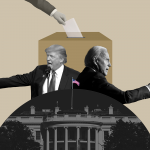Days after a white supremacist demonstration incited racial violence and claimed three lives in Charlottesville, Virginia, President Donald Trump blamed “many sides,” asserted that the “alt-left” was also “very, very violent” and championed Confederate iconography.
Public criticism and political fallout followed, with national business leaders and Republican lawmakers alike condemning his comments. Yet the president and his moral indifference with white supremacist violence and ideologies should not surprise Americans. Although perceived as unprecedented, his words honor our oldest presidential precedent: apathy regarding racial terrorism.
U.S. presidents have long ignored domestic racist violence and terror. Our earliest executives exclaimed “all men are created equal” but excluded enslaved men and women.
President Thomas Jefferson opposed slavery as a “hideous blot” and a “moral depravity,” yet he owned more than 100 slaves and raped and impregnated an adolescent Sally Hemings, a woman he owned until his death. President Andrew Jackson, a man President Trump eulogized as a “very tough person” with “a big heart,” slaughtered and displaced native peoples and tortured runaway slaves. Others, including President Franklin Pierce, pursued perverse political compromises like the 1854 Kansas-Nebraska Act, prolonging pre-Civil War political violence between abolitionists and pro-slavery forces.
As post-war Reconstruction revolutionized Southern society, white supremacist terror organizations, such as the Ku Klux Klan and the White League, intimidated white progressives and murdered free black citizens.
Lynching was a common political weapon against Republican rule and African-American autonomy, and extrajudicial violence became a popular communal practice. Many white citizens and officials tortured and lynched at least 400 black men and women between 1868 and 1871.
President Ulysses Grant supported Reconstruction policies and signed the 1870 and 1871 Enforcement Acts and the 1871 Ku Klux Klan Act. However, federal troops were removed altogether after the corrupt Compromise of 1877 ended Reconstruction.
White supremacist violence continued unabated, and an American president would not again address racial terrorism until President Theodore Roosevelt denounced lynching during a 1903 statement and later again during his 1906 State of the Union speech.
President Woodrow Wilson, a segregationist, condemned lynching more than a decade later, but only after the NAACP criticized and protested federal inaction after an East St. Louis, Illinois, race riot killed 40 African-Americans.
His successor, President Warren Harding, supported an unsuccessful anti-lynching bill, but President Franklin Roosevelt later denied anti-lynching advocates any support, afraid his approval would threaten his New Deal agenda. A recent Equal Justice Initiative report documented “4075 racial terror lynchings of African Americans … between 1877 and 1950,” yet, without significant presidential support, modern anti-lynching legislation never passed Congress.
During the presidential debates, President Trump said, “To solve a problem, you have to be able to state what the problem is or at least say the name.” President Trump is not able.
He has, however, enabled racial terrorism.
Twelve days after his inauguration, President Trump dismantled the Countering Violent Extremism program, a Homeland Security program monitoring all violent domestic organizations, including white supremacist groups. He ignored a May joint FBI-DHS memo warning against white supremacist groups “likely … to pose a threat of lethal violence over the next year.”
Throughout his political career, The Donald has courted white rage. Why would he denounce white mob violence? He is the president of the United States, and presidential ambivalence is an American tradition.
Allen Coon is a senior public policy leadership and African-American studies major from Petal.













